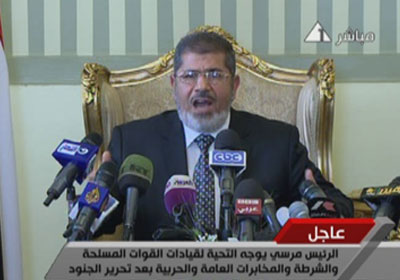
Mohamed Morsy, Egypt's first elected president since the 25 January 2011 uprising, has been in power for 12 months. His rise to power boosted hopes for prosperity, particularly after his election platform made broad promises to revitalise the economy. However, the performance of the Egyptian economy has not stood up to those expectations.
In the first year of Morsy's presidency, Egypt has seen a state of instability at the political and security levels that has negatively impacted several economic sectors such as tourism, construction and real estate, with economic growth rates registering only 2.3 percent in the first nine months of the current fiscal year. This, in turn, has raised unemployment rates to 13.2 percent in the first quarter of 2013, compared to 12.5 percent in the third quarter of 2012.
Since its installment, Prime Minister Hesham Qandil’s cabinet has announced intentions to implement austerity measures to reduce the growing budget deficit to pave the way for borrowing from the IMF. However, the postponement of some of those measures has caused the budget deficit to continue to widen, reaching LE 203 billion in 11 months, up 48 percent from the same period in the previous fiscal year.
The budget deficit has led to greater internal and external borrowing, causing the local public debt to hit LE1.3 trillion by the end of March 2013, the equivalent of 80 percent of the gross domestic product. In June, the Governor of the Central Bank of Egypt (CBE) said external debt has climbed to US$44 billion.
Egypt had US$15.5 million of foreign currency reserves when Morsy assumed power. Those reserves slipped to $13.6 billion in January 2013, only to rise again to $16.039 billion in May 2013, bolstered by Arab assistance to Egypt. Even though the CBE has used tenders to control the drain on reserves, the measure has failed to stop the deterioration of the value of the Egyptian pound versus the dollar, with the price of the dollar ratcheting to LE7 in June 2012 and raising the price of imported commodities.
Legislation has focused on income tax (Law 11/2013 which amends some articles of the Income Tax Law 91/2005, which was amended by Law 101/2012), real estate tax (Law 196/2008 and amendments in Law 103/2012), stamps (Law 9/2013 which amends Stamps Tax Law 111/1980 amended by Law 104/2012 and its bylaws). The aforementioned pieces of legislation have increased tax proceeds yet disregarded economic competence.
The Sukuk Law has sparked controversy since it gave the Finance Minister the right to form a jurisprudential authority for sukuk even though the power to from this authority should have been granted to a concerned authority, such as Al-Azhar. The law also grants this jurisprudential authority and other civilian monitoring authorities the right to monitor performance, a flaw which might create a conflict of competencies, prompt manipulation and cause responsibility to be lost between two monitoring bodies while the international tradition is to have a single body monitor all securities.
In the first year of Morsy's presidency, the fuel and electricity crises renewed, with the government failing to provide a radical solution and only making promises. Easing those shortages in the short run requires foreign currency to purchase the country's needs of petroleum products. A medium-term solution would entail amending the system of production and distribution of fuel and expanding the scope of use of renewable energy.
Economic decision-making has not changed after the revolution. The government has tried to monopolize the process of economic decision-making– such as in determining the closing hours for shops –failing to consider new mechanisms introduced by the revolution such as societal dialogue. This failure has eventually increased the political cost of economic decisions and hampered their implementation.
During the current fiscal year, Egypt has received several economic assistance packages from countries such as Qatar, Saudi Arabia, Libya and Turkey. In addition, some countries have pledged to make major investments in Egypt. However, experts have been wary of the motives behind this assistance and the continuing political turmoil and unrest have hampered the flow of some of the pledged aid to Egypt.
One of the most significant reform efforts with regards to the provision of basic services in the first year of Morsy's presidency was the implementation of a new bread subsidization system in a number of governorates in the first quarter of 2013 to curb the smuggling of flour and provide quality bread to the citizens. Despite the efforts exerted in this respect, the new system lacked a mechanism to monitor bakeries and the distribution system still needs to be reviewed to ensure greater competence and effectiveness.
It can therefore be said that after one year as president Morsy's achievements do not satisfy the requirements for generating sustainable development.
The piece is a summary of an analysis by Al-Masry Studies and Information Center




